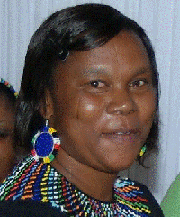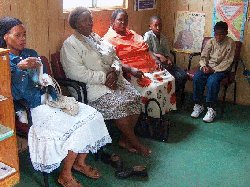
Staff: Bazamile Magubane and Zandile Zikode. Bazamile has been with CCJ since 2006, and Zandile from 1998
to 2003 and again from 2008.
Contact details: 039 834 2169 (tel)
District: Sisonke Municipal District (the Midlands of KwaZulu-Natal).
Most common cases: Domestic violence and maintenance issues.
Areas served: Donnybrook, KwaNokweja, Ofafa and Richmond.
Description:

The centre (left), which is situated in the rural town of Ixopo at the Magistrate's Court, serves farming and traditional areas, all of which are under Amakhosi and Izinduna (traditional leaders).
Many people from surrounding areas visit the town for their shopping, health and other needs, and the office is easily reachable on these occasions. At the same time, transport is infrequent and expensive and roads poor and sometimes impassable in wet weather. Some surrounding areas cannot be visited in a day by coordinators, who must plan for two-day trips
In 2011, the office attended to 795 cases, with domestic violence (495) and legal advice (205) being the most common.
Zandile Zikode

How long have you worked for CCJ?
“The main cause of domestic violence is lobola. Our men believe that they have bought you. If that law can be taken out, that would help.” - Coordinator Zandile Zikode |
From 1997 to 2003, and from 2008 What led you to become a support centre coordinator?
It was a love of working with people and a pleasure of helping my community.
What are the most common cases that your clients come to you with?
They are domestic violence cases.
How do you deal with those cases?
We explain the options to clients. Most choose protection orders and we help them to fill in the forms. We also offer mediation and when the clients choose it, it is mostly successful.
Is there any law you would like to change?
The main cause of domestic violence is lobola. Our men believe that they have bought you. If that law can be taken out, that would help.
(Left) Clients wait in Ixopo Support Centre
What role do traditional customs play in your work?
Sometimes people want to claim damages, for example from a man if he has made a girl pregnant. We refer these cases to the traditional courts.
Would you say people’s attitudes and behaviour are starting to change?
Yes, men come and talk about their problems more now. Before it was only women who came, and men thought that we were only an office for women. Men report cases of abuse by women against them, but they are also afraid to speak out.
Who are your role models?
My role model is Nkosazana Zuma because she is a divorcee who is independent, strong and successful and has a high position in her work.
What advice would you give children in Ixopo?
Educate yourself so that you are not dependent on anyone else. Most problems are because victims are dependent on someone.
What are the biggest challenges that you face in your work?
We need a car and office equipment to inform people of the law and educate them. We need a phone and computer. We are allowed a budget for cellphones but they are expensive and we don’t like to use them.
Can you describe a case that you found particularly rewarding or difficult?
There was a group of women who jointly invested money in Ithala bank and one of them died. In order to get the money for the other women, a relative of that woman had to go to the bank and confirm that the woman had died and cancel her account and enter another name as an investor. I asked the dead women’s husband to come to the office and bring his ID so we could do this.
The bank asked for a letter of authority from the court to release the money, but the lady at the court refused to give us one. She had actually written that letter already and it had been sent to Pietermaritzburg by mistake. I asked her again for the letter and she refused. Then I asked for her details and said that my head office would call her to follow up the matter. At this point she agreed to write a new letter and we got it the next morning. I went to the bank with the letter, cancelled the former account and the women all got their money.
Bazamile Magubane

How long have you worked for CCJ?
“When a man abuses his wife, he thinks that wife is his property and he has the right to do whatever he wants. He feels ‘How can she complain when I have paid for her?’” - Coordinator Bazamile Ngubane |
Since 2006 What led you to become a support centre coordinator?
I knew it was a company that works with the community. I wanted to help people and love to work with people.
What are the most common cases that your clients come to you with?
They are domestic violence cases.
How do you deal with those cases?
We use mediation and protection orders. I would say that protection orders work about 50% of the time. They have bad effects sometimes and can help lead to divorce. Mediation usually works, but not all the time.
Is there any law you would like to change?
I would change the customary law of lobola. I feel domestic violence is started by lobola. Men think they can rule and control their wives as a result of having paid lobola. When a man abuses his wife, he thinks that wife is his property and he has the right to do whatever he wants. He feels ‘How can she complain when I have paid for her?’

What role do traditional customs play in your work?
We don’t deal with cases using those customs. We just tell clients their rights according to the law. If they don’t want to use the law, we refer them to the traditional courts.
(Left) A woman collects maintenance from coordinator Bazamile Magubane
Would you say people’s attitudes and behaviour are starting to change?
Yes. Some men change after mediation when they learn that women also have rights.
Who are your role models?
My role model is my honourable director Winnie Kubayi. The way she takes her work seriously, respects her employees, the effort she makes to make us happy, and how strong she is.
Can you describe a case that you found particularly rewarding or difficult?
There is a type of case: when I have intervened in a case of serious domestic violence and done a follow-up and I find out that I have made changes in that house. Then I feel great and honoured.
What are the biggest challenges that you face in your work?
The biggest challenge is transport. The police are helpful but can’t always assist us as they are themselves short of vehicles. As a result we sometimes come two hours late to appointments. This undermines our standing in the community. We have no electricity and it also gets very hot sometimes in the office so we open the door and then there is no privacy. We need a fax, computer and photocopier as we have to borrow these things at the magistrate’s court while our clients wait for us. Telephoning is a problem – we get a budget to call on cellphones but it is expensive and it would be better to use landlines.
I would like head office to organise counselling twice a year. Our work is stressful and it affects us emotionally and psychologically. Every day I see problems in marriage. If we could get this help it would boost our minds and give us more energy for our work.
What advice would you give children growing up in Ixopo?
Children should be aware that they have responsibilities as well as rights. They should be aware of drugs – some children start trying them from age nine. They should respect their parents. For example some children call the police to report their parents instead of listening to them.